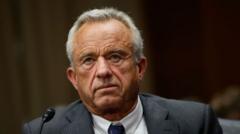Robert F. Kennedy Jr.'s recent confirmation as the US Health and Human Services Secretary sparks debate, reflecting broader concerns regarding health policy and governance.
Controversial Appointment: RFK Jr Sworn in as HHS Secretary

Controversial Appointment: RFK Jr Sworn in as HHS Secretary
Tracing the Implications of Robert F. Kennedy Jr's Appointment Amid Skepticism
Robert F. Kennedy Jr. has been officially sworn in as the United States Health and Human Services Secretary, a position that places him at the helm of crucial health agencies and a vast budget. This appointment, one of President Donald Trump’s most polarizing moves, was confirmed by the Senate with a narrow 52-48 vote, but attracted no support from Democratic lawmakers. Former Senate Majority Leader Mitch McConnell was the sole Republican dissenting vote against Kennedy’s confirmation.
Kennedy now presides over a workforce of about 80,000 across key health institutions such as the Centers for Disease Control and Prevention (CDC) and the Food and Drug Administration (FDA). His confirmation comes as part of the President's effort to reconfigure the executive cabinet at an accelerated pace, with significant appointments also including Brooke Rollins as the Secretary of Agriculture.
The Senate's sessions have been intense as they finalize confirmation votes for the cabinet, and Kennedy's administration faces scrutiny due to his controversial views on vaccines and health misinformation. Notably, he has been involved with the anti-vaccine group Children's Health Defense, raising questions regarding his suitability for a role that demands public trust and scientific credibility.
While Kennedy has asserted that he does not oppose vaccinations and actually supports more rigorous safety evaluations, his past statements and affiliations have prompted bipartisan concerns. Many legislators questioned his commitment to overseeing the health sector responsibly, particularly in managing pharmaceuticals and public health initiatives.
During the confirmation process, Kennedy engaged in heated exchanges with lawmakers over his views on vaccination and abortion rights, indicating his agreement with Trump that decisions concerning abortion should be left to state control. This position drew criticism from various Democratic members who accused him of compromising his prior stance on pro-choice advocacy.
The confirmation process was largely marred by protests and contentious discussions, with crowds expressing their opposition loudly. Yet, some Republicans applauded Kennedy's critique of food additives and his calls for reducing the influence of big pharmaceutical companies.
Notably, Caroline Kennedy, a cousin of Robert F. Kennedy Jr., urged lawmakers to reject his nomination, citing his vaccine beliefs as disqualifying factors. Despite this, key Republicans like Louisiana Senator Bill Cassidy ultimately supported his confirmation. Cassidy has projected a hopeful vision for Kennedy’s capability to revitalize America’s health sector.
As President Trump’s administration continues to expedite cabinet nominations, attention is now turning to the upcoming confirmations of other controversial figures, including Howard Lutnick as Secretary of Commerce. The legislative body remains poised to address significant appointments, navigating criticisms and implications for public health policy under Kennedy's leadership.


















